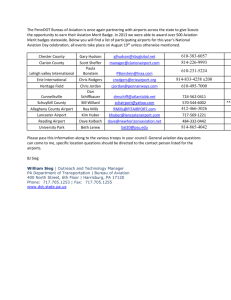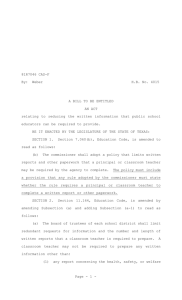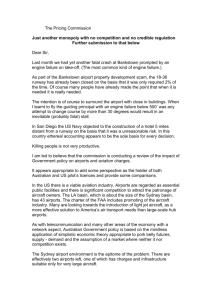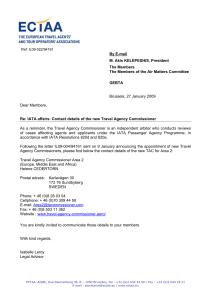Word Document - Maine Legislature
advertisement
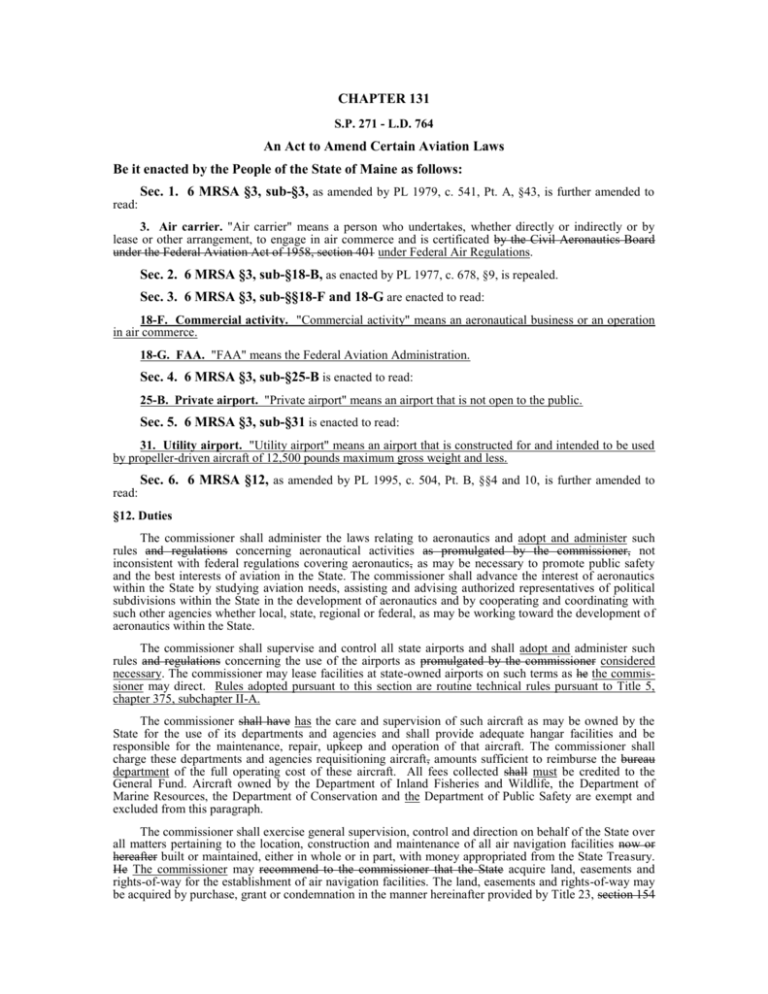
CHAPTER 131 S.P. 271 - L.D. 764 An Act to Amend Certain Aviation Laws Be it enacted by the People of the State of Maine as follows: Sec. 1. 6 MRSA §3, sub-§3, as amended by PL 1979, c. 541, Pt. A, §43, is further amended to read: 3. Air carrier. "Air carrier" means a person who undertakes, whether directly or indirectly or by lease or other arrangement, to engage in air commerce and is certificated by the Civil Aeronautics Board under the Federal Aviation Act of 1958, section 401 under Federal Air Regulations. Sec. 2. 6 MRSA §3, sub-§18-B, as enacted by PL 1977, c. 678, §9, is repealed. Sec. 3. 6 MRSA §3, sub-§§18-F and 18-G are enacted to read: 18-F. Commercial activity. "Commercial activity" means an aeronautical business or an operation in air commerce. 18-G. FAA. "FAA" means the Federal Aviation Administration. Sec. 4. 6 MRSA §3, sub-§25-B is enacted to read: 25-B. Private airport. "Private airport" means an airport that is not open to the public. Sec. 5. 6 MRSA §3, sub-§31 is enacted to read: 31. Utility airport. "Utility airport" means an airport that is constructed for and intended to be used by propeller-driven aircraft of 12,500 pounds maximum gross weight and less. Sec. 6. 6 MRSA §12, as amended by PL 1995, c. 504, Pt. B, §§4 and 10, is further amended to read: §12. Duties The commissioner shall administer the laws relating to aeronautics and adopt and administer such rules and regulations concerning aeronautical activities as promulgated by the commissioner, not inconsistent with federal regulations covering aeronautics, as may be necessary to promote public safety and the best interests of aviation in the State. The commissioner shall advance the interest of aeronautics within the State by studying aviation needs, assisting and advising authorized representatives of political subdivisions within the State in the development of aeronautics and by cooperating and coordinating with such other agencies whether local, state, regional or federal, as may be working toward the development of aeronautics within the State. The commissioner shall supervise and control all state airports and shall adopt and administer such rules and regulations concerning the use of the airports as promulgated by the commissioner considered necessary. The commissioner may lease facilities at state-owned airports on such terms as he the commissioner may direct. Rules adopted pursuant to this section are routine technical rules pursuant to Title 5, chapter 375, subchapter II-A. The commissioner shall have has the care and supervision of such aircraft as may be owned by the State for the use of its departments and agencies and shall provide adequate hangar facilities and be responsible for the maintenance, repair, upkeep and operation of that aircraft. The commissioner shall charge these departments and agencies requisitioning aircraft, amounts sufficient to reimburse the bureau department of the full operating cost of these aircraft. All fees collected shall must be credited to the General Fund. Aircraft owned by the Department of Inland Fisheries and Wildlife, the Department of Marine Resources, the Department of Conservation and the Department of Public Safety are exempt and excluded from this paragraph. The commissioner shall exercise general supervision, control and direction on behalf of the State over all matters pertaining to the location, construction and maintenance of all air navigation facilities now or hereafter built or maintained, either in whole or in part, with money appropriated from the State Treasury. He The commissioner may recommend to the commissioner that the State acquire land, easements and rights-of-way for the establishment of air navigation facilities. The land, easements and rights-of-way may be acquired by purchase, grant or condemnation in the manner hereinafter provided by Title 23, section 154 et seq. sections 154 to 161, and property so acquired may be conveyed to a town for use in connection with the establishment of air navigation facilities for such a consideration as the commissioner may determine. Sec. 7. 6 MRSA §13, first ¶, as repealed and replaced by PL 1977, c. 678, §27, is amended to read: The commissioner shall have has the power to hold investigations, inquiries and hearings concerning matters covered by chapters 1 to 17 and the rules, regulations and orders of the commissioner promulgated thereunder adopted under chapters 1 to 17. Hearings shall be are open to the public and, except as provided in chapter 4, shall must be held upon such notice as the commissioner may by regulation rule provide. The commissioner shall have has the power to administer oaths and affirmations, certify to all official acts, issue subpoenas and order the attendance and testimony of witnesses and the production of papers, books and documents. In case of the failure of any person to comply with any subpoena or order issued under the authority of this section, the commissioner may invoke the aid of any court of this State of general jurisdiction. The court may thereupon order that person to comply with the requirements of the subpoena or order or to give evidence touching the matter in question. Failure to obey the order of the court may be punished by the court as a contempt thereof of the order. Sec. 8. 6 MRSA §17, sub-§4, as enacted by PL 1977, c. 678, §30, is amended to read: 4. Inspection. Inspection of all commercial and noncommercial utility airports open to the public and all private airports with commercial activity; Sec. 9. 6 MRSA §51, sub-§2, as amended by PL 1995, c. 504, Pt. B, §10, is further amended to read: 2. Utility airports. A. The commissioner shall issue registration certificates for noncommercial utility airports which that are open to the public. A fee of $25 for each registration shall must be paid by the owner. Prior to the issuance of the registration, the non-commercial utility airport which that is open to the public shall, except with prior permission from the owner, must at least meet such the minimum standards as that are contained in chapter 6. The registration certificate shall be is valid until January 1st of the next calendar year unless sooner revoked, suspended or cancelled. B. It shall be is unlawful to operate a noncommercial utility airport which that is open to the public without a valid registration certificate. Sec. 10. 6 MRSA §51, sub-§6 is enacted to read: 6. Private airports with commercial activity. The commissioner shall issue registration certificates for private airports with commercial activity. A fee of $50 for each registration must be paid by the owner. Prior to the issuance of the registration, the private airport with commercial activity must at least meet the minimum standards that are contained in chapter 6. The registration certificate is valid until January 1st of the next calendar year unless sooner revoked, suspended or cancelled. Sec. 11. 6 MRSA §52, sub-§1, ¶B, as amended by PL 1995, c. 504, Pt. B, §10, is further amended to read: B. The commissioner is authorized to issue registration certificates and decals for all civil aircraft based in this State. A state registration certificate shall be is valid from the date of issuance through the last day of February of the next calendar year. This certificate shall is not be transferable except with the prior written approval of the commissioner. (1) Every owner of an aircraft with a current Maine registration, valid through April 30, 1980, shall receive a 2-month credit for registration paid for the aircraft registration year 1979-80 only. The credit provided in this subparagraph shall be applied to the aircraft registration renewal for the registration year 1980-81. Sec. 12. 6 MRSA §101, sub-§2, as enacted by PL 1977, c. 678, §33, is amended to read: 2. Utility airports. A. General Aviation II Utility airports are airports which that are publicly or privately owned and open to the public and subdivided into 2 classes: (1) Land; or (2) Seaplane. B. Utility airports may not conduct commercial activities. Sec. 13. 6 MRSA §101, sub-§5 is enacted to read: 5. Private airport with commercial activity. A. A private airport with commercial activity is an airport that is not open to the public, but supports a commercial activity. Sec. 14. 6 MRSA §102, sub-§3, ¶A, as enacted by PL 1977, c. 678, §33, is repealed. Sec. 15. 6 MRSA §103, sub-§1, ¶B, as enacted by PL 1977, c. 678, §33, is repealed. Sec. 16. 6 MRSA §103, sub-§3, ¶B, as enacted by PL 1977, c. 678, §33, is amended to read: B. Airports Land airports without paved runways shall must have the boundaries of the usable landing area defined with clearly visible markers painted yellow white. Sec. 17. 6 MRSA §105 is enacted to read: §105. Aviation fueling facilities Airports may, at their option, provide aircraft fuel servicing. The operations must meet the following minimum standards. A. Aviation fuel must be stored in National Fire Protection Association approved facilities. B. Aircraft fuel servicing must be conducted in accordance with accepted standards and requirements established by the National Fire Protection Association. C. There must be fire extinguishers of adequate size, type and numbers in locations as recommended by the National Fire Protection Association. Sec. 18. 6 MRSA §302, sub-§2, ¶A, as amended by PL 1995, c. 504, Pt. B, §10, is further amended to read: A. The membership of the board shall consist consists of 5 members; one person from the Maine Airport Association an airport association in the State; one person from the Maine Pilot's Association a pilot's association in the State; and 3 persons appointed by the Commissioner of Transportation, one of whom shall may not represent an interest in aviation. The members representing the aviation organizations shall be are appointed by their respective board of directors and all members shall serve a term of office of 2 years. Vacancies in membership shall must be filled in the same manner as the original appointment. The commissioner shall serve serves as secretary of the board. Sec. 19. 6 MRSA §302, sub-§3, ¶A, as enacted by PL 1977, c. 678, §48, is amended to read: A. The board shall annually elect a chairman chair from among its members, and the chairman shall serve chair serves a term of one year. The board shall meet at the call of the chairman chair, or at the call of at least 3 members of the board, and there shall must be at least 3 meetings one meeting held a year. See title page for effective date.



